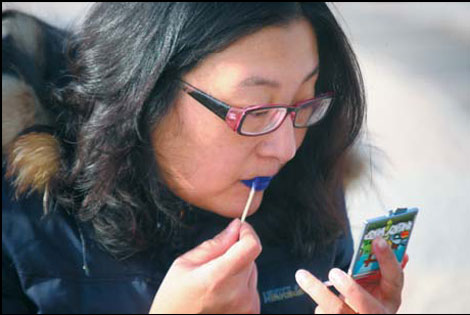Spotlight shines on rare diseases
 |
|
A woman who has pulmonary arterial hypertension, which leads to heart failure, applies blue lipstick to increase public awareness of the rare disease. Provided to China Daily |
Chen Lizhang stands behind a desk, looking at the crowds bargaining, in the early spring coldness of Beijing's Huilongguan Sports Park.
They are busy buying and selling second-hand baby clothes, and no one seems to notice the 1.4-meter-tall Chen and the flyers on his desk.
The 35-year-old founded Home of Little People, a volunteer group that helps dwarfs.
Chen is taking part in a charity bazaar for rare diseases awareness organized by the nascent Chinese Patients Union, as the fifth international Rare Disease Day falls on Feb 29.
"Dwarfism is a kind of rare disease, but ordinary people have only a vague concept of what a rare disease is," Chen says. "We need more attention."
A rare disease is any disease or condition that affects a small percentage of the population.
"There are about 6,000 to 7,000 rare diseases worldwide, and more than 80 percent are genetic," says Zhao Xinliang, a genetic defects specialist at Peking University Health Science Center.
The World Health Organization (WHO) defines rare diseases as any disease or condition that effects 0.065 to 0.1 percent of the population.
It is estimated that about 10 million people have rare diseases in China, says Ma Jianian, vice-director of the Education Development Center of China Youth Concern Committee.
"Inadequate medical care and a lack of insurance are the major problems that most rare diseases patients have to face," Zhao says.
"Most rare diseases are genetic and, hence, chronic, and cost a lot of money. Once affected, the whole family may be drawn into debt."
Chen says his family had to sell their house to treat his disease when he was a boy. Since he was 3, he has been having growth hormone injections at his family's expense, since they had no medical insurance or government aid.
Although the injections are effective, he did not have the opportunity to grow taller because his family couldn't afford the injections on a regular basis.
Ma was helped by her relatives when her premature daughter was born in 2006, so she founded Home for Premature Babies in 2007.
The goal of the association is to give advice and limited financial support to the families of premature babies, especially those from the countryside, who lack knowledge, medical care, drugs and facilities.
Prematurity, dwarfism and amyotrophic lateral sclerosis (ALS), the disease that affects British scientist Stephen Hawking, are relatively well-known rare diseases in China, but there are many others the public have no idea about, Ma says.
"Rare disease patients need more care from the government and society," Ma says. "The public is not aware of rare diseases and usually miss the best time for prevention or treatment, and that is a shame."






















